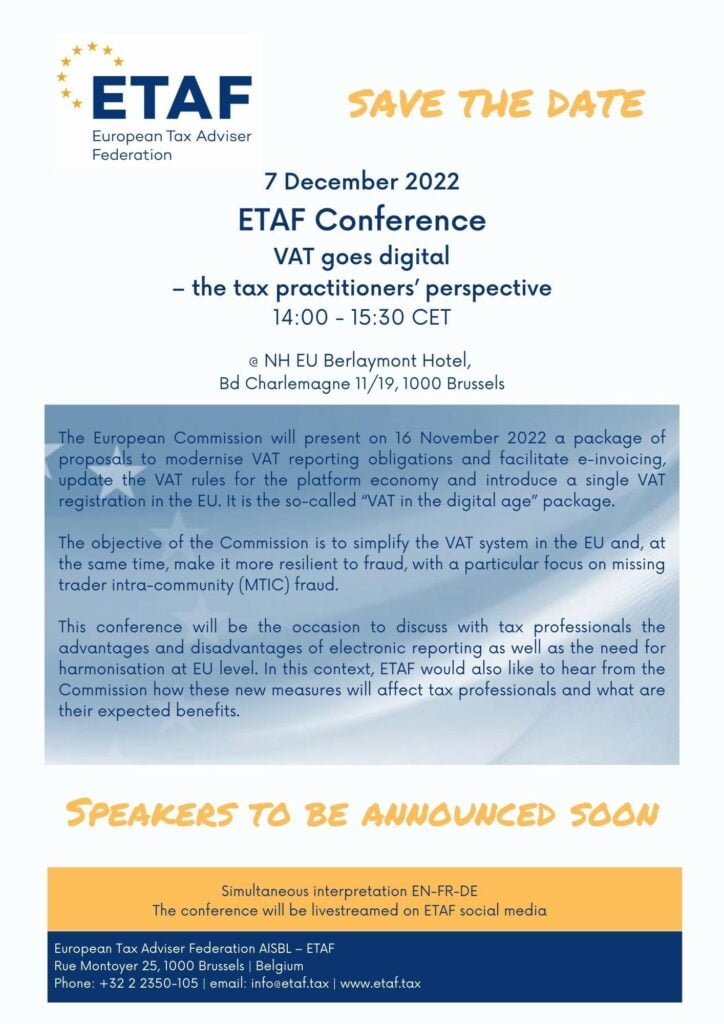The European Tax Adviser Federation (ETAF) published on Wednesday 12 October its answer to the European Commission’s public consultation on a proposal for a Directive to tackle the role of enablers that facilitate tax evasion and aggressive tax planning (Securing the Activity Framework for Enablers – SAFE), expected in the first half of 2023. ETAF firmly rejected the Commission's reductive portrayal of an entire profession as "enablers" and urged it to correct this generalisation. Because their professional laws already require them to provide tax advice in line with tax compliance, we advocate that regulated tax professionals should be excluded from the scope of the future Directive. The future proposal must also be strictly limited to complex structures in non-EU countries and contain a clear definition of aggressive tax planning. ETAF also appealed to the EU legislators to strictly separate tax evasion, which is a criminal offence punishable by law in all Member States, from aggressive tax planning, which is legally legitimate, although ethically doubtful. Our detailed position can be consulted here.
The European Commission opened on Thursday 13 October a public consultation on its future proposal for a common EU corporate tax base, called Business in Europe: Framework for Income Taxation (BEFIT). The initiative was announced by the Commission already in its communication on Business Taxation for the 21st Century in May 2021 and a proposal of Directive is expected for the third quarter 2023. With this initiative, the Commission wants to address the complexity and high costs that businesses, notably those with cross-border activities, face as a result of having to comply with 27 different corporate tax systems. The design of the proposal will build on the 2011 Common Consolidated Corporate Tax Base (CCCTB) and the two 2016 Common Corporate Tax Base (CCTB) and (CCCTB) proposals, the Commission explains. These proposals were rejected by Member States but the Commission assures that the new proposal will entail a different approach. It will also get inspired from the OECD two-pillar agreement. In the questionnaire, the Commission proposes several options for the scope, the calculation of the common tax base and the formula for allocating taxable profits between Member States. In terms of filling simplifications, the Commission is, among other things, considering putting in place a single EU corporate tax return combined with a one stop-shop for submitting the group’s tax return. Stakeholders have until 5 January 2023 to send their feedback to the Commission.
MEPs from the Committee on Economic and Monetary Affairs (ECON) of the European Parliament discussed, on Monday 10 October, the amendments tabled on Lídia Pereira’s (EPP, Portuguese) draft report on the UNSHELL directive aimed at preventing the abuse of shell entities for tax purposes. Some amendments from the Green/EFA group aim at allowing Member States to consider for a period of three years that the undertaking is presumed to have minimum substance on the condition that the factual and legal circumstances of the undertaking remain unchanged during this period, instead of having to prove the minimum economic substance every year. Other amendments from the EPP group suggest that Member States shall require that undertakings meeting the criteria set out in the Directive declare in their annual tax return, for each tax year, only if they do not meet the indicators of minimum substance. The S&D group wants to add a new indicator to determine the minimum economic substance according to which the profitability per employee on a full-time equivalent basis and per assets and the turnover on assets should not exceed 3 times the average of the sector in the EU Member State. A total of 200 amendments were tabled to the draft directive. Shadow rapporteurs reportedly held their first negotiation meeting on Thursday 13 October.
MEPs from the FISC subcommittee of the European Parliament discussed on Thursday 13 October the tax policies of the Netherlands with the Dutch State Secretary for Tax Affairs, Marnix van Rij, to assess the progress of national tax reforms aiming at tackling aggressive tax schemes. Mr van Rij explained that the Netherlands is already reaping some of the benefits of its efforts to move away from the image of a tax haven with which it is sometimes associated. Flows of money to low tax jurisdictions had fallen sharply, he said. The discussion also addressed the Dutch government's views on upcoming and ongoing initiatives at EU level such as the UNSHELL Directive, the minimum corporate tax rate, and the updates to the rules on exchange of information. Mr van Rij supported the UNSHELL directive and considered that the use of majority voting or enhanced cooperation in tax matters should be considered when unanimity did not work.
The OECD unveiled on Monday 10 October a new global tax transparency framework to provide for the reporting and exchange of information with respect to crypto-assets. The Crypto-Asset Reporting Framework (CARF) will ensure transparency with respect to crypto-asset transactions, through automatically exchanging such information with the jurisdictions of residence of taxpayers on an annual basis, in a standardised manner similar to the Common Reporting Standard (CRS), the OECD said. It will target “any digital representation of value that relies on a cryptographically secured distributed ledger or a similar technology to validate and secure transactions”. Entities or individuals that provide services effectuating exchange transactions in crypto-assets for, or on behalf of customers would be obliged to report under the CARF, it added. The OECD said it was also updating the global exchange of information model CRS, to cover digital financial products. Over the next months, the OECD will be taking forward work on the legal instruments to facilitate the international exchange of information collected on the basis of the CARF and to ensure its widespread implementation. The European Commission is set to use this model to update the EU’s directive on administrative cooperation (DAC8).

